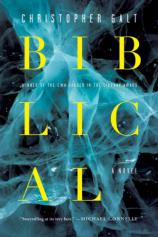Biblical
Review
Biblical
As the “About the Author” section that opens BIBLICAL hastens to explain, Christopher Galt is a pseudonym for a frequently translated, popular and much-honored author. That man is Craig Russell, who is primarily known for his mystery novels. BIBLICAL is not a mystery, which may partly explain the reason for the pen name. Its use, in a subtle way, goes to the heart of the book’s subject matter, which is reality approached sideways.
The title itself is somewhat of an enigma. It would be easy to imagine Galt spending half of his time explaining what his novel is, and the other half explaining what it is not. On the one hand, the title may raise the hackles of non-believers and rationalists who might otherwise come away from the book with at least some support for their worldview. Believers and people of faith, on the other hand, might expect a religious screed, which most certainly it is not. BIBLICAL is a lot of things, and could probably be best (if not entirely accurately) characterized as science fiction. Picture a collaboration between the science-based work of Michael Crichton and the reality-questioning novels of Philip K. Dick, and you get a pretty good overview of what the book is about.
"BIBLICAL makes one think, regardless of where you stand. It certainly is worth your time for that reason alone, as well as any number of others."
Galt keeps things moving by switching points of view in each chapter. The overriding story deals with a host of strange occurrences that may or may not be randomly connected. They include an early morning mass suicide at San Francisco’s Golden Gate Bridge; a teenage girl who insists she has witnessed and recorded Joan of Arc being burned at the stake; and the kidnapping and murder of a geneticist. Then there is the graffiti appearing randomly across the country, proclaiming “We Are Becoming.” Becoming what? you might ask. Indeed.
A brilliant, driven but standoffish psychiatrist named John Macbeth (as names go, do they get any better than that?) and an expert in psychoses, Josh Hoberman, are summarily recruited by the President to work with the FBI to investigate what is occurring. Macbeth is in the middle of what is called the Copenhagen Project, which involves the reverse engineering of human intelligence. As improbable as it may seem to the scientists, it appears the events in question may be a spiritual phenomenon. Or is it something else? Is the source the arrival of the singularity --- the point at which artificial intelligence exceeds human intellectual capacity and, more importantly, control --- and from that, the breakdown of reality as we know it? There are other issues --- cultural and political --- in play, and the closer that Macbeth and Hoberman get to what may (or may not) be the truth, the more dangerous things become for them and everyone else.
BIBLICAL is a challenging book on several levels. I was only 40 pages in before I started questioning my own existence (Am I really sitting here reading/writing this? Or is my brain encased in a large jar?). If one of Galt’s intents in writing the novel was to feed into each individual reader’s paranoia, he has succeeded on at least one count. It also will tick you off to some degree, depending on your point of view of the way in which the world does --- or should --- work. But that is okay, too, maybe even desirable. If there is a weakness here, it is Galt’s penchant --- which, admittedly, is occasionally necessary --- for stopping the action while the characters engage in a discourse that explains concepts leading into what is occurring at any particular moment. Fortunately, Galt’s writing chops are such that even this shortcoming is, for the most part, entertaining and rarely bogs the story down.
Most importantly, BIBLICAL makes one think, regardless of where you stand. It certainly is worth your time for that reason alone, as well as any number of others.
Reviewed by Joe Hartlaub on October 3, 2014





